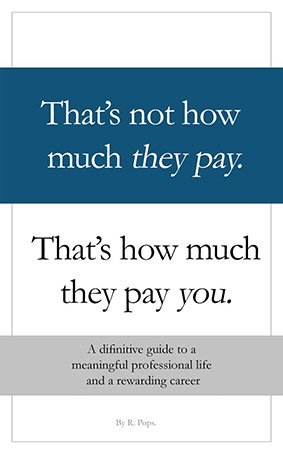People who work in IT (or for that matter any industry) can be grouped in three categories:
- The Builders - folks who actually build stuff and get things done.
- The Story Tellers - folks who weave remarkable stories around what's getting built and help sell what builders build.
- The Whiners - folks who complain about why they cannot build remarkable products or weave remarkable stories.
A lot of this blog has been about what companies can do to build environments and cultures that seeds and grows builders and weeds out whiners. A good part of what I wrote about back in 2009 was about that.
Then I grew older.
When I look at the software landscape now I realize that in our search for a perfect organization that can keep us motivated and engaged, we as programmers, may have become incredibly demanding and often even unfair about what it takes for a company to make and keep us happy and productive.
As Joel Spolsky puts it in one of his discussion groups:
I still haven't met a great programmer who doesn't have a job. I still can't fill all the openings at my company.
(As programmers) Our pay is great. There's no other career except Wall Street that regularly pays kids $75,000 right out of school, and where so many people make six figures salaries for long careers with just a bachelors degree. There's no other career where you come to work every day and get to invent, design, and engineer the way the future will work.
Despite the occasional idiot bosses and workplaces that forbid you from putting up dilbert cartoons on your cubicle walls, there's no other industry where workers are treated so well. Jesus you're spoiled, people. Do you know how many people in America go to jobs where you need permission to go to the bathroom?
Stop the whining, already. Programming is a fantastic career. Most programmers would love to do it even if they didn't get paid. How many people get to do what they love and get paid for it? 2%? 5%?
I don't get the negativity in here. How did the Joel on Software discussion group turn into a mutual mope-fest for angsty emo girls.
It is one thing to objectively take a stand and disagree with your organization on something or even look for another opportunity if you aren't happy with your current job. It's another to systematically cultivate a depressed attitude towards your work life, take rash decisions and blame your organization for everything that's not quite right in your work life.
"The Times are Bad!"
"There are No good jobs left these days!"
"The economy is struggling!"
"Nobody gets more than a 10% hike now a days!"
"Of course I'm depressed! That's all my company pays!"
Ever heard these statements? Have you ever been the voice behind these statements?
About a year ago, I saw an entire group of genuinely talented programmers inching down this path of negativity and decided that I was going to do research on just how true the above statements are.
The research turned into a book and the response to the last remark - "Of course I'm depressed! That's all my company pays" became the title of the book:

"That's Not How Much They Pay. That's How Much They Pay You!"
The book is a collection of stories from my own life in the High Tech industry and a collection of research and studies done in the field of neuroscience and psychology that shows you the problem with today's work life.
The book builds on the premise that the problem in your work life today is not "the times", "the economy", sadist bosses or evil clients.
The problem with today's work life is you.
The style of writing used in the book is a tad bit confrontational, but I do hope it brings you face to face with some of the biggest problems in work life today and then gives you the insight, science and tools to deal with those problems like a mature adult so that you can stop whining and start doing what you've always done - build stuff, weave remarkable stories and be happy!
It is a Kindle book but you can just as easily download it on your mobile device or tablet using the Amazon Kindle App.
I don't want to end up sounding like a cheesy self help guru who claims his book will change your life but I really believe it might give you value which is more than the price you pay for it.
I'd love to hear your honest feedback and reviews both; on amazon and here. And I do hope that if the book inspires you or adds value to your life, you'll go ahead and spread the word.
Comments are closed.